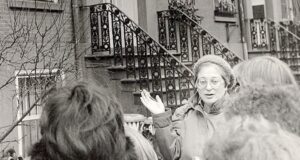
In the gym at St Luke’s Church of England primary school in Bury, neat rows of uniformed children sit cross-legged for the daily assembly. After a brief talk and perhaps a song, they join in the school prayer. “God be in my head and in my thinking,” it begins, and ends with “Amen”.
Nothing unusual about that. Except St Luke’s is a Christian school with a Jewish headteacher and an overwhelming majority of Muslim pupils. This is either – depending on your view – a brilliant example of British multiculturalism or a stark illustration of the redundancy of faith schools. Or perhaps both.
Melanie Michael, St Luke’s gregarious and enthusiastic head, is immensely proud of her leadership of a C of E school. “I actively chose a Christian school; I love what it has to offer and its values,” she said.
Before coming to St Luke’s at the beginning of this year, for nine years she was head of another C of E school in Manchester, St Chrysostom’s, whose pupils spoke more than 25 different languages and included followers of all major faiths.
When she was appointed, the selection board – headed by the local vicar – told her it was “a very positive thing to appoint a non-Christian”.
That view is just as well in the light of a recent C of E report, which has highlighted the difficulties of church schools in finding practising Christians to lead their 4,700 institutions in the UK, responsible for educating more than 1 million children. Most of the schools are heavily oversubscribed.
“Recruitment of school leaders with the necessary understanding and commitment is proving increasingly difficult, and sometimes impossible,” said the report. “Many dioceses have become more flexible around the requirement that headteachers need to be practising Christians and can reference successful church school heads who are from other faiths or none at all but are able to maintain a clear vision for education.”
But, it warned, “in the long term there is a risk to the vision if sufficient numbers of teachers and school leaders with a deep understanding of and engagement with the Church of England cannot be deployed”.
According to Nigel Genders, the C of E’s chief education officer, this was a small part of a much broader internal report, which examined how the church should support its schools and train staff to deliver a “compassionate and compelling vision of education, based on Christian values, in which children flourish and which parents love”.
But, he acknowledged, “some diocese are finding it difficult to recruit people with the necessary vision. There’s a shortage of people who can take the step into leadership”. This was not a problem specific to C of E schools, but a reflection of a “general shortage of people willing to be heads because of the pressures of the role”.
Last year, the national school governors’ body said headteacher vacancies were being repeatedly re-advertised because of a dearth of candidates, following a 2013 survey that found one in four primary headships were not filled within 60 days. The problem was expected to worsen as headteachers of the baby boom generation retired.
In Manchester, nine months after Michael left St Chrysostom’s, the school has yet to appoint a replacement headteacher. Adverts for the vacancy had “emphasised the important links between the church and the school, and we expect the head to develop those links, but we haven’t said he or she must be a practising Christian”, said the vicar, Ian Gomersall.
It was more important to have a good headteacher – but with an understanding of the value and importance of faith, he added.
St Chrysostom’s intake was about 40% Muslim, with the remainder reflecting a mixed local population with a large refugee element. Another C of E school in the parish, St John’s, was 90-95% Muslim, said Gomersall. “The Muslim community appreciate what they see in faith schools. For Islam, taking faith seriously is important; secularism is often seen as a problem.”
Michael, who comes from an orthodox Jewish background but attends synagogue only occasionally these days, said her faith guided her in wanting to promote values such as compassion, forgiveness, tolerance and humility – “a moral code which flows through everything”. She wanted her pupils to be “proud to be British and proud of their heritage”.
More than a quarter of her staff are Muslim. Teaching assistant Manaza Parveen invited Michael to her mosque shortly after her appointment. “Bury has a big Jewish presence, but there’s not much interaction between communities,” said Parveen. News of Michael’s mosque attendance soon spread. “People were saying, ‘She’s Jewish, but she’s OK.’”
Earlier this week, St Luke’s hosted a celebration for the Muslim festival Eid al-Adha, inviting parents to bring dishes and wear traditional clothing. The next day, pupils trooped off to nearby St Peter’s church to perform a concert. “Three hundred Muslim kids in a Christian church – how wonderful is that?” said Michael, adding that the next concert might be in a mosque or a Hindu temple or the nearby Jewish museum.
Parents could withdraw their children from such outings, or from collective worship within the school, but such a move was unusual, she said. Not all children participated in reciting the school prayer, but they were expected to be respectful, still and solemn.
“I’m really passionate about what church schools offer. Many [secular] schools have strong values, too, but faith schools take these values to a different dimension,” said Michael.
The National Secular Society opposes faith schools. “Parents have the right to raise their child in accordance with their religious and philosophical convictions, but they should not expect to do that via the state or our publicly funded schools. We consider the promotion and public funding of religious schools to be divisive and detrimental to social cohesion,” it says.




